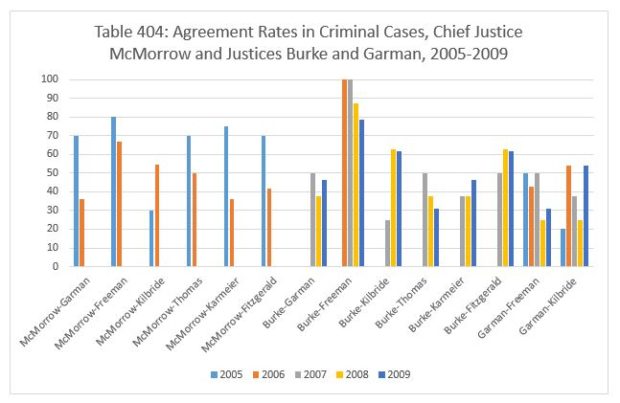
Yesterday, we analyzed the agreement rates between all combinations of the Justices in non-unanimous civil cases between 2005 and 2009. Today, we turn our attention to the Court’s criminal docket during the same years.
We report the data for Chief Justice McMorrow, Justice Burke and Justice Garman in Table 404 below. Chief Justice McMorrow’s closest match for criminal cases on the Court during 2005 was Justice Freeman, but not by a wide margin. Chief Justice McMorrow and Justice Freeman voted together in 80% of non-unanimous criminal cases that year. She voted with Justice Karmeier 75% of the time, with Chief Justice Thomas and Justices Garman and Fitzgerald 70% of the time, but with Justice Kilbride only 30% of the time. Chief Justice McMorrow’s agreement rates with other Justices fell across the board in 2006, her final year on the Court. She voted with Justice Freeman in two thirds of non-unanimous civil cases, with Justice Kilbride 54.54% of the time, with Chief Justice Thomas half the time, with Justice Fitzgerald in 41.67% of cases, and with Justice Garman only 36.36% of the time.
Justice Burke participated in only one non-unanimous criminal cases in 2006, voting with Justice Freeman. For 2007, Justice Burke’s agreement rate remained at 100% for Justice Freeman, but was quite low otherwise: Chief Justice Thomas and Justices Garman and Fitzgerald were at 50% each, Justice Karmeier was at 37.5%, and Justice Kilbride was at 25%. The patterns were similar in 2008. Justice Burke agreed with Justice Freeman in 87.5% of non-unanimous criminal cases, with Chief Justice Fitzgerald and Justice Kilbride 62.5% of the time, but with Chief Justice Thomas and Justices Garman and Karmeier only 37.5% of the time. Justice Burke’s agreement rate with Justice Freeman fell a bit in 2009 to 78.57%, but across the rest of the Court, agreement rates rose a bit. She agreed with Chief Justice Fitzgerald and Justice Kilbride 61.54% of the time, with Justices Garman and Karmeier in 46.15% of cases, but with Justice Thomas only 30.77% of the time. The Table shows that Justice Garman was not closely aligned in criminal cases with either Justice Freeman or Justice Kilbride. In 2005, she voted with Justice Freeman in only half of non-unanimous criminal cases, and only 20% of the time with Justice Kilbride. Her agreement rates for both Justice Freeman (42.86% in 2006; 50% in 2007; 25% in 2008; 30.77% in 2009) and Justice Kilbride (53.85% in 2006; 37.5% in 2007; 25% in 2008; 53.85% in 2009) remained comparatively low in the years that followed.

As we see in Table 405, Justice Garman voted quite closely in criminal cases to the records of the other Republicans on the Court. Justice Garman’s agreement rates with Chief Justice Thomas were 100% in 2005, 92.86% in 2006, 100% in 2007, 75% in 2008, and 84.62% in 2009, and with Justice Karmeier were 87.5% in 2005, 85.71% in 2006; 87.5% in 2007, and 100% in 2008 and 2009. Chief Justice Fitzgerald was relatively close to the Republicans in voting patterns in criminal cases during these years too. Chief Justice Fitzgerald agreed with Justice Garman in 100% of cases in 2005, 85.71% of the time in 2006, 75% of the time in 2007 and 2008, and 84.62% of the time in 2009. For 2005, Justice Freeman agreed with Justice Karmeier in 62.5% of criminal cases, and with Chief Justice Thomas and Justices Kilbride and Fitzgerald in 50%. The following year, he agreed with Justice Kilbride 64.29% of the time, and with Chief Justice Thomas 53.33% of the time, but with Justice Fitzgerald in only 46.67% of non-unanimous criminal cases, and with Justice Karmeier in only 42.86%. For 2007, he agreed with Chief Justice Thomas and Justice Fitzgerald in half of the non-unanimous criminal cases, but with Justice Karmeier only 37.5% of the time, and with Justice Kilbride only 25%. For 2008, Justice Freeman agreed with Justice Kilbride in three quarters of the non-unanimous criminal cases, but with Chief Justice Fitzgerald only half the time, and with Justices Thomas and Karmeier in only a quarter of the cases. For 2009, Justice Freeman agreed with Chief Justice Fitzgerald and Justice Kilbride in 46.15% of non-unanimous criminal cases, with Justice Karmeier 30.77% of the time, and with Justice Thomas in 15.38% of cases.
Justice Kilbride’s agreement rates in criminal cases with Chief Justice Thomas and Justice Karmeier were quite low. Justice Kilbride voted with Chief Justice Thomas in only 20% of non-unanimous criminal cases, in 57.14% of cases in 2006, 37.5% of the time in 2007, 0% in 2008, and in 69.23% of cases in 2009. He agreed with Justice Karmeier 37.5% of the time in 2005, 53.85% in 2006, 25% in 2007 and 2008, and only 53.85% of the time in 2009. Justice Kilbride’s agreement rate with Chief Justice Fitzgerald was higher, but not much: 20% in 2005, 64.29% in 2006, 50% in 2007 and 2008, 69.23% in 2009. Chief Justice Thomas and Justice Karmeier voted quite similarly in criminal cases, with agreement rates of 87.5% in 2005, 92.86% in 2006, 87.5% in 2007, 75% in 2008 and 84.62% in 2009. Chief Justice Thomas’ agreement rate with Justice Fitzgerald was 100% in 2005 and 93.33% in 2006, but dropped to 75% in 2007, 50% in 2008 and 69.23% in 2009. Justice Karmeier agreed with Justice Fitzgerald in 87.5% of cases in 2005, 85.71% in 2006, 62.5% in 2007, 75% in 2008 and 84.62% in 2009.

Join us back here next Tuesday as we turn our attention to the Court’s voting dynamics in the most recent period – 2010-2015.
Image courtesy of Flickr by Bari D (no changes).